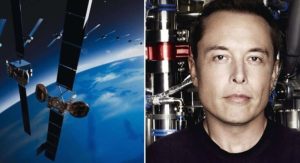Elon Musk revealed more about his plan to colonize Mars

Elon Musk, the billionaire founder of SpaceX and Tesla Motors, has revealed his company’s plan to transport humans to Mars.

Reasons why it’s important to colonize Mars
By Elon Musk, President and CEO of SpaceX, this has been a dream of humanity for a long time.
I just want to make sure that we’re setting our sights appropriately and not missing anything because we’ll be revisiting these questions in a few years. When I was thinking about what to do next, I didn’t want to start another company; it just didn’t feel like something I wanted to do again.
But when you look at life extension technology – really understanding what it takes to make someone healthy – and rethinking all the possible causes of disease, that’s something we should do as humans no matter what. We have a duty to other sentient life forms to help them flourish too.
What would most affect the future of humanity? Most people would say space travel or artificial intelligence – but I would pick longevity and an independent planet. Getting out there is extremely important for making sure everything is good on Earth and making sure that humanity survives long-term.
The main reason why we haven’t had a space program over these last few decades is that it was too expensive – it used up more money than anyone could imagine without getting much useful work done within any reasonable cost frame.

Why Elon Musk is the right person to lead this mission
Despite his knack for publicity, there’s no question that Elon Musk is one of Earth’s most visionary inventors. The creator of PayPal, Tesla Motors, and SpaceX has successfully launched rockets into space and launched a new era in private space travel.
In fact, his company SpaceX just reached an agreement with NASA to ferry American astronauts to the International Space Station from American soil again. So when Musk speaks on topics such as Mars colonization, it’s worth listening to what he has to say.
Without a doubt, Musk wants to settle on Mars – and he believes that can be done with today’s technology. He estimates that building a self-sustaining civilization will cost about US$200,000 per person, which could make things very interesting here on Earth if successful.
Do we have billionaires moving into space while billions of people remain stranded on their home planet? Hope not. But according to Musk, colonization isn’t just necessary – it’s inevitable. He predicts that humanity will become a multiplanet within a century due to overpopulation and threats from climate change at home…It seems highly unlikely that Musk will eventually succeed in making it happent sooner rather than later.
How long will it take?

SpaceX hopes to develop fully reusable rockets quickly, a feat that will dramatically reduce launch costs. It will also likely launch the first manned spacecraft from Florida’s Kennedy Space Center instead of Vandenberg Air Force Base, located further north in California.
The plan will require significant testing before anyone sets foot on Mars. But for Musk, it’s all part of his long-term goal: Make life multiplanetary, he said at a press conference. That is important to humanity as a whole.
It will be difficult, risky and there will be some casualties along the way…but you can totally do it. I think we should do that. And if we don’t do that, we will eventually be destroyed.
There are no other planets to move to. And so really our only option is to be a space travel civilization and a multiplanet species. Because otherwise, if we were on a planet…we would definitely go extinct eventually.
How did SpaceX get there so quickly?

There are many other plans being made by other companies, organizations and governments for space exploration, especially with missions involving life on other planets. The European Space Agency (ESA) is also planning a mission to Jupiter’s moon Europa which is considered a prime candidate for life in our solar system due to its subsurface ocean that scientists say could support life as we know it.
They are also working on technology for missions like sending smaller ships into space and potentially building bases on asteroids or planets. Another SpaceX plan called Red Dragon will send people to Mars using existing technologies like their Falcon Heavy rocket.
SpaceX’s Red Dragon mission is currently still in development and may not continue, but could be an indication of what’s to come from Elon Musk. SpaceX also recently filed with US regulators to send 4,425 satellites into space as part of a project called Starlink.
The primary goal is to provide global Internet access using these satellites, however, it will also help track missions like NASA’s TESS and other Earth observation projects. It’s just one of many plans that are slowly coming to fruition.
What other plans are being made by other companies, organizations and governments?
NASA has announced plans to travel to Mars by 2030. SpaceX, a private space exploration company, is also working on a plan to establish life in space. Their goal aligns with NASA’s goal: to send humans to Mars by 2025 at the earliest. CEO Elon Musk has detailed his vision for a self-sustaining city on Mars in an interview and received a standing ovation from the audience.
What would life on Mars be like?

Life on Mars will be very different from life on Earth. Mars has a much lower gravity, which means that people who move there will experience major physical changes over time. Life on Mars also poses major challenges to human existence.
At the current level of technological progress, it would not be possible to grow food outside for long because of high UV radiation and dust storms. However, scientists say that if humans can live inside the earth or in domes with food grown inside, then living on Mars might not be so challenging.
Thanks to research done by missions like Curiosity, we’ve got some good information about what life might be like on Martian soil – it’s fairly alkaline and similar to soil in some respects. In fact, tests have shown that certain types of bacteria can survive on Mars without any problems!
On top of that, water ice is sometimes exposed at various locations around Mars at certain times of the year. This opens up even more possibilities for life as well as other potential forms of colonization (planting trees and maintaining large populations). It’s all about technology but I think it’s a matter of when not if not.
Final Thoughts
SpaceX, Tesla and SolarCity founder Elon Musk revealed his updated plans to colonize Mars, a step he says is necessary for humanity to avoid extinction. The tech entrepreneur said he envisions 1 million people living on Mars within 40 to 100 years, with around 10 billion people living on several planets.
Currently, an estimated 200,000 people have permanently left the Earth’s atmosphere. At SpaceX headquarters in Hawthorne, California today (September 27), Musk detailed his revised vision of colonizing other planets using technology that could be available within our lifetimes.
On Mars, you can start a self-sustaining civilization and grow it into something really big, Musk said at a talk in Mexico. The SpaceX CEO went on to explain how to make Mars habitable for humans over time.
The first step would be to use giant reusable spacecraft – called BFRs (Big Fucking Rockets) – and solar panels to transport people and materials to Mars. Next, makeshift shelters will be built using glass panels and carbon dioxide collectors on the planet’s surface – and eventually, earthen workers will alter the atmosphere to make it fresh air.
To fund his ambitious space vision, which could cost as much as $10 billion a year for decades, Musk said he will refocus his energy business: In 2018, he plans to start deploying the first BFRs.
The timetable for all of these projects is very aggressive, which is why some critics of SpaceX argue that it may be too big to succeed. But as The Boring Company and Tesla have pointed out, sometimes Musk’s seemingly impossible projects can turn into real-life products in an amazingly short time.
So while a red planet colony might sound like science fiction today, many experts agree it will be possible within our lifetime. As National Geographic said: It’s not a matter of whether we go to Mars – it’s a matter of when.
Video :







